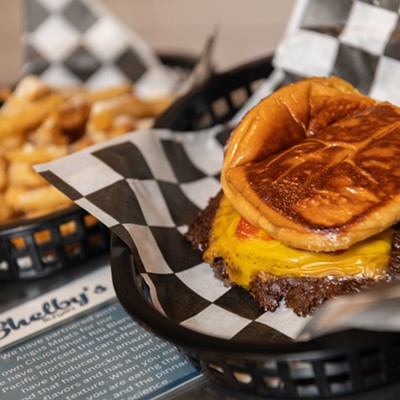The Temple Beth Shalom has overflowed. Cars have burst its parking lot and now clog 30th Avenue, having trickled nearly to Arthur Street.
The smell of brisket and carrot tzimmes billows out of the doors and the kitchen vents, alighting down the block in front of the Court Arthur apartments.
It’s Sunday, and a congregation of roughly 200 Jewish families is hosting around 2,000 visitors — a few priests, at least one nun, a gospel choir, Baptists, Presbyterians, the non-religious.
They wait outside while cops search their bags, they mill about in the foyer browsing through the hamsas, baked goods and books on topics in Judaica. They sidle up to the side entrance for orders to go. They sit in the sanctuary, waiting for the band to strike up — looking, ultimately, to eat, but content also to sit and revel.
For the 71st time, the Gentiles have been invited to the synagogue and this year — like last year, and the year before that — they have come out in droves.
In 1941, Spokane’s Jewish community decided to hold a dinner for the community that would act as an outreach and a thank you. It was a time when Polish Jews had been rounded up and were starving in the Warsaw Ghetto. A time when, as one congregant put it last week, “people were pleading with Roosevelt to bomb the tracks! Please bomb the tracks.” It’s not clear that was the reason for creating the dinner, but Jewish congregants had helped get at least 50 German Jews out from under Hitler’s regime. Spokane was becoming a less hospitable place, too. Fascist silver shirts had been seen prowling downtown streets since the ’30s.
There is precedent in Jewish culture for using feasts to commemorate deliverance from hard times. Passover memorializes the flight from Egypt, while Purim rejoices in deliverance from Persia. From the stage, Berdine Bender, vocalist for the klezmer band Chutzpah, explains why so much joy and so much sadness can be tied to so much food.
“The thing you need to understand about Jewish festivals,” she says, “is that they’re all celebrating the fact that somebody tried to kill us, but they didn’t succeed. So what should we do? Eat!”
Three days earlier, during Purim, the kitchen at Temple Beth Shalom is all laughter. Jokes about grandmothers. Jokes about children. Jokes about the Six-Day War (“[Israel] destroyed an airport and only lost three kosher kitchens!”)
Four tall men and one incredibly small woman stand around a Montague Grizzly stove, waiting for an incredible amount of minced onion to sweat itself clear. David Meyersberg is a chef trained at the Culinary Institute of America, but today, he says, “I’m just a peon cook.”
The person in charge, Ethel Grossman, would hit the men about belly-button height. There is a picture of her at a kosher dinner in 1963, when she was 29, “which makes me 30 [now],” she jokes. The carrot tzimmes is her recipe. She says it has orange concentrate, and I ask if that’s a traditional ingredient for a family recipe. Ethel giggles a little and puts her hand to her mouth, “I made it up.”
Hundreds of pounds of carrots will eventually be added, along with cases of the concentrate and an entire pantry’s worth of spices. Because the rules governing kosher meals prohibit mixing meat and dairy, the dish also includes massive quantities of margarine.
“Kosher does not mean low-fat,” says Taylor Bressler, Ethel’s second-in-command.
The food is the thing here. But to a degree that cannot be said about other cuisine, there would be no Jewish food without the culture that gave birth to it. Likewise, for the deeply observant, there is no culture without the food. For them, you can’t be a Jew and not keep kosher, an idea that binds a people with their produce in the most intimate way possible.
None of the assembled take the food laws quite that seriously, but in a congregation of families that can trace their roots back to Spokane’s founding, the cultural tie of food is still strong.The men in the kitchen, with Ethel presiding, begin telling stories from childhood. Jews would heat utensils in a stove or with a blowtorch to sterilize them to switch between meat and milk, but Bressler says in the old days you couldn’t do that with knives.
“The handles were wood, they’d burn,” he explains, “so I remember my grandmother would bury her knife in the yard.”
Ethel’s husband, Floyd Geller, cuts in, “If it got trayf!” [meaning un-kosher] “Right! Trayf!” Bressler responds, “And she’d bury it for one … moon!” “One moon!” Floyd shouts back. The room erupts in belly laughter. These are things the men all know or have heard about, passed down in situations just like this.
Geller tells how his grandmother would take out the light bulbs the day before Sabbath and pre-tear the toilet paper. Bressler remembers stories of how entire neighborhoods would cordon themselves off with metal wire (some still do) to satisfy an orthodox rule about working on the Sabbath. “Now that’s serious old-world Jew stuff,” he says.
Bressler and Ethel Grossman say that, though they’re bound to family by the warp of blood, they’re woven to the congregation — and to their Jewish heritage at large — by the weft of their shared tradition.
And even as technology has changed the way people observe their traditions, the traditions continue to connect them.
Nobody buries knives in the ground anymore. “Dishwashers changed everything,” Geller says. Everyone nods.
The word for un-kosher — trayf — doesn’t mean dirty or unclean, it means “shredded.” Disorderly.
Just as there was no whiff of the trayf during preparation, there is no disorder among the wait staff — all congregants, all-volunteer. The grownups serve, while the kids wash dishes or bus tables. Some of the boys running around with water pitchers wear tie-dyed yarmulkes. One of them wears a black Zoo York ball cap.
This is a community, Ethel Grossman says, that has withstood the best and the worst of the world. The trick is to engage with it, and to teach your kids to as well.
“It’s
important for our children to understand and know that we have lived
here as a community,” she says, “and committed ourselves to making the
City of Spokane a healthy environment and a happier place.”

















